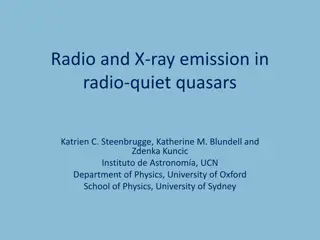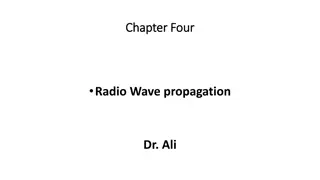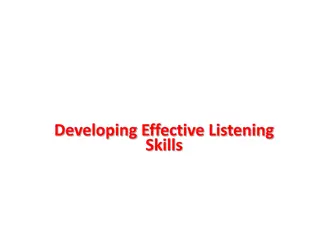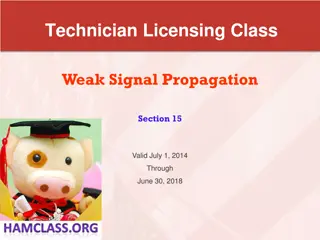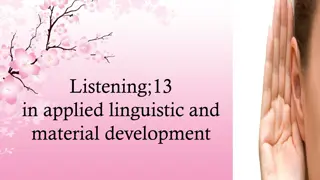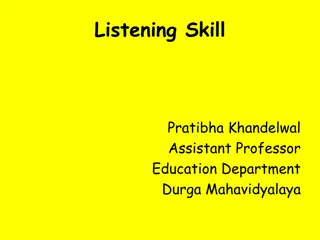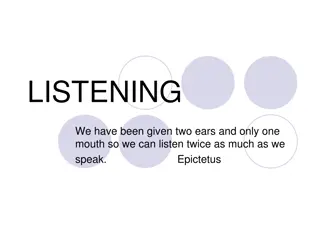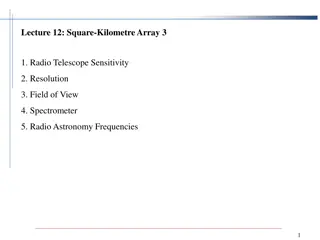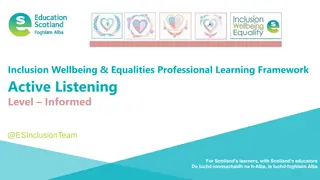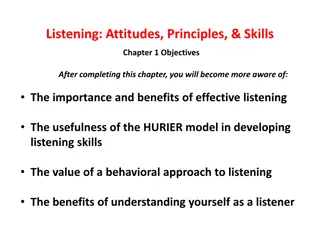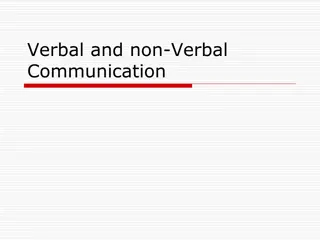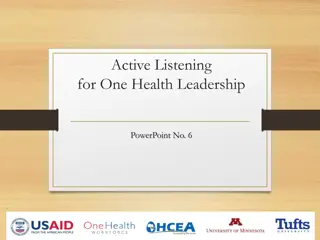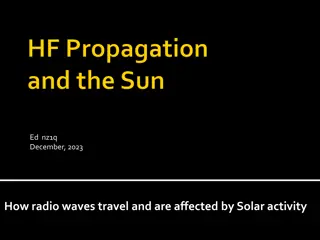Insights on Children's Radio Listening Habits: An Analysis from RadioGauge
Supplementary data from RadioGauge reveals interesting patterns in young listeners aged 4-16. Findings show an increase in radio listening as children grow older, with higher rates among children of CR listener parents. The study also highlights locations where children listen and the prevalence of joint listening between parents and kids, which slightly decreases as children age.
- Childrens Radio Listening
- RadioGauge Analysis
- Parental Influence
- Joint Listening Habits
- Young Listeners
Download Presentation

Please find below an Image/Link to download the presentation.
The content on the website is provided AS IS for your information and personal use only. It may not be sold, licensed, or shared on other websites without obtaining consent from the author. Download presentation by click this link. If you encounter any issues during the download, it is possible that the publisher has removed the file from their server.
E N D
Presentation Transcript
Understanding radio listening amongst children 4-16 An analysis of supplementary data taken from RadioGauge
Note on data source Questions added to end of RadioGauge dips running between 4th September and 15th November (8 dips in total) Key questions focused on:- Whether children listened to the radio and where Levels of joint listening, including when and where Results split between respondents with children aged 4-10 and 11-16 yrs to understand differences
Note on sample 1920 respondents with children aged 4-16 (taken from overall RG database of 4810) 1442 CR Listeners; 478 non CR listeners 1013 have children aged between 4 and 10 (21.1% of original sample) 907 have children aged between 11 and 16 (18.9% of original sample)
Radio listening Radio listening increases as children get older Do your children listen to the radio? % saying yes 70.5% 61.9% 4yrs to 10yrs 11yrs to 16yrs Base: All respondents with kids aged 4-16 yrs Source: RadioGauge panel
Radio listening Radio listening is higher amongst children whose parents are CR listeners Do your children listen to the radio? % saying yes 75.4% 69.3% 68.3% 54.7% 4yrs to 10yrs 11yrs to 16yrs CR Listeners BBC Listeners Base: Respondents with kids aged 4-16 yrs Source: RadioGauge panel
Listening location children Listening in the bedroom and when out and about increases in older kids Where do your children listen to the radio? 86.9% 82.3% 52.1% 35.0% 31.5% 24.4% 20.6% 11.3% In the car In their bedroom Children 4-10 In the kitchen Children 11-16 Out and about Base: Respondents with kids aged 4-16 yrs Source: RadioGauge panel
Joint radio listening Overall joint listening is high but decreases slightly as children get older Are there times when you listen with your children? % saying yes 97.1% 91.5% 4yrs to 10yrs 11yrs to 16yrs Base: Respondents with kids 4-16 Source: RadioGauge panel
Joint listening locations Most joint listening is when in the car with little difference between the age groups Where do you listen to the radio with your children? 89.4% 88.0% 37.0% 36.2% 8.6% 6.7% 6.6% 6.1% In the car In their bedroom Children 4-10 In the kitchen Children 11-16 Other Base: Respondents with kids aged 4-16 yrs Source: RadioGauge panel
Joint listening occasions Weekends and school run are the most common joint listening occasions (the latter especially for 4-10 yr olds) When do you listen to the radio with your children? 69.7% 68.3% 59.1% 47.8% 44.7% 41.9% 36.7% 32.1% 31.8% 29.2% 5.4% 4.7% Weekends On the school run After school Evenings During breakfast Other Children 4-10 Children 11-16 Base: Respondents with kids aged 4-16 yrs Source: RadioGauge panel
Summary Children of CR listeners more likely to be radio listeners themselves Listening in the bedroom and when out and about increases as children get older Potentially reflecting growing independence and greater access to radio (e.g. mobile phones) Joint listening is high but declining slightly amongst older children Weekends and the school run are the most common joint listening occasions


